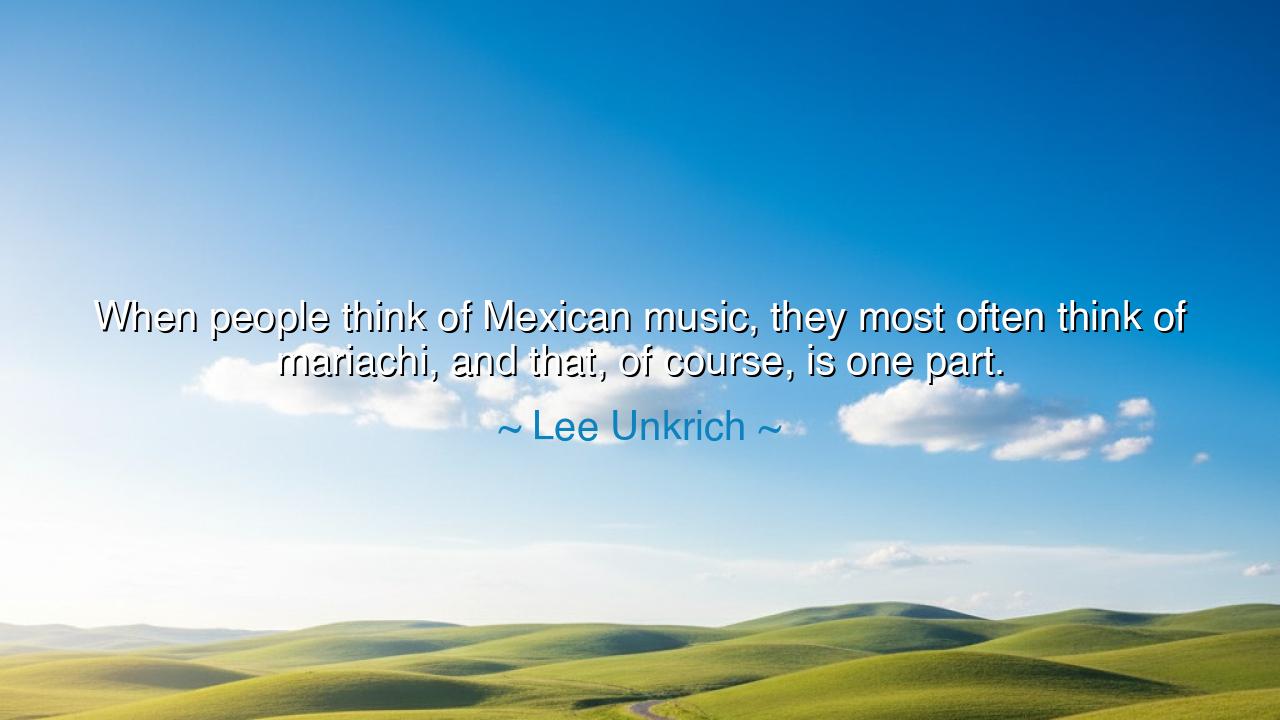
When people think of Mexican music, they most often think of
When people think of Mexican music, they most often think of mariachi, and that, of course, is one part.






Lee Unkrich, the filmmaker who brought the spirit of Mexico to the world through Coco, once reflected: “When people think of Mexican music, they most often think of mariachi, and that, of course, is one part.” In these words lies not only a recognition of art, but a deeper meditation on identity, memory, and the richness of culture. For to confine the soul of a people to a single image, however beautiful, is to overlook the vast ocean of tradition that lies beyond. Mariachi is indeed a radiant jewel, but it is only one among many in Mexico’s musical crown.
When he speaks of mariachi, Unkrich points to the sound most often associated with Mexican culture—trumpets, violins, guitars, voices rising in harmony to tell tales of love, of sorrow, of land, and of pride. It is music of plazas and celebrations, of weddings and festivals, of voices singing together in joy. Yet he adds, with humility, that it is but one part. For Mexican music is a great river fed by many streams: ranchera, corrido, son jarocho, huapango, bolero, cumbia, and more—each carrying centuries of history, struggle, and devotion.
This truth reminds us of the danger of reducing the richness of any culture to a single image. Identity is not a fragment—it is a tapestry. Just as mariachi was born in Jalisco, so son jarocho rose from Veracruz with its African, Spanish, and Indigenous roots, carrying the jaranas and the haunting call of “La Bamba.” Just as corridos told the stories of revolutions and heroes, so boleros carried whispers of longing and love. Each style is not separate, but woven together to form the living heartbeat of Mexico.
Consider the example of Amparo Ochoa, whose voice carried the songs of the people—the forgotten, the Indigenous, the laborers of the land. She did not sing mariachi, yet her music was no less Mexican, no less sacred. Her ballads reminded listeners that culture cannot be confined to one form. Similarly, the group Los Lobos, drawing from traditional son jarocho, brought “La Bamba” to global recognition. In both cases, the world was reminded that Mexico’s music is not singular, but plural, vast, and enduring.
The deeper meaning of Unkrich’s words is this: to truly honor a culture, one must see its fullness. To see only mariachi is to love one star and ignore the constellation. But to listen to all of Mexico’s music is to glimpse the soul of its people in their entirety—their joys, their sorrows, their battles, their dreams. Mariachi is the door, but beyond the door lies a mansion of sound.
The lesson for us is clear: do not reduce cultures, peoples, or identities to one image or stereotype. Every nation, every person, is more than one part. To see them in their fullness requires humility, listening, and a willingness to move beyond the surface. As with music, so with humanity: the beauty is in the whole, not the fragment.
Practically, this means: seek out more than what the world first presents to you. If you love mariachi, also listen to son jarocho, corridos, and rancheras. If you admire one part of a culture, look deeper—into its poetry, its food, its history, its struggles. Do not be content with a single story. In doing so, you will not only honor others, but enrich your own soul.
So let us remember Unkrich’s wisdom: “Mariachi is one part.” A beloved part, yes, but still only one. Let us honor the fullness of music, of culture, of humanity itself. For only when we embrace the many voices can we hear the true harmony—the harmony not of fragments, but of wholeness, echoing across time like the eternal song of the human spirit.






AAdministratorAdministrator
Welcome, honored guests. Please leave a comment, we will respond soon